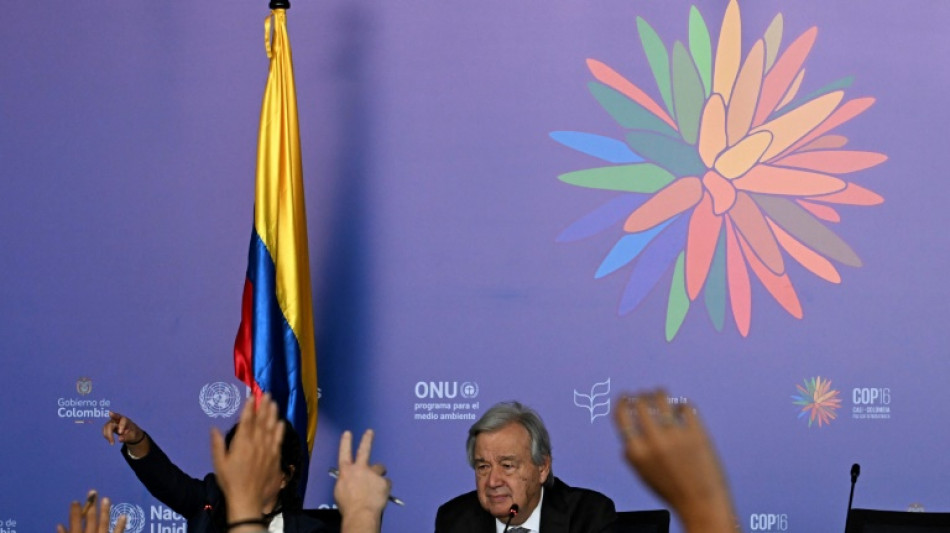
-
 Oil execs work COP29 as NGOs slam lobbyist presence
Oil execs work COP29 as NGOs slam lobbyist presence
-
Gore says climate progress 'won't slow much' because of Trump

-
 'Megaquake' warning hits Japan's growth
'Megaquake' warning hits Japan's growth
-
Stiff business: Berlin startup will freeze your corpse for monthly fee

-
 Wars, looming Trump reign set to dominate G20 summit
Wars, looming Trump reign set to dominate G20 summit
-
Xi, Biden attend Asia-Pacific summit, prepare to meet

-
 Kyrgios to make competitive return at Brisbane next month after injuries
Kyrgios to make competitive return at Brisbane next month after injuries
-
Dominican Juan Luis Guerra triumphs at 25th annual Latin Grammys

-
 Landslide win for Sri Lanka president's leftist coalition in snap polls
Landslide win for Sri Lanka president's leftist coalition in snap polls
-
Australian World Cup penalty hero Vine takes mental health break

-
 As Philippines picks up from Usagi, a fresh storm bears down
As Philippines picks up from Usagi, a fresh storm bears down
-
Tropical Storm Sara pounds Honduras with heavy rain

-
 Pepi gives Pochettino win for USA in Jamaica
Pepi gives Pochettino win for USA in Jamaica
-
'Hell to heaven' as China reignite World Cup hopes with late winner

-
 Rebel attacks keep Indian-run Kashmir on the boil
Rebel attacks keep Indian-run Kashmir on the boil
-
New Zealand challenge 'immense but fantastic' for France

-
 Under pressure England boss Borthwick in Springboks' spotlight
Under pressure England boss Borthwick in Springboks' spotlight
-
All Blacks plan to nullify 'freakish' Dupont, says Lienert-Brown

-
 TikTok makes AI driven ad tool available globally
TikTok makes AI driven ad tool available globally
-
Japan growth slows as new PM readies stimulus

-
 China retail sales pick up speed, beat forecasts in October
China retail sales pick up speed, beat forecasts in October
-
Asian markets fluctuate at end of tough week

-
 Gay, trans people voicing -- and sometimes screaming -- Trump concerns
Gay, trans people voicing -- and sometimes screaming -- Trump concerns
-
Argentina fall in Paraguay, Brazil held in Venezuela

-
 N. Korean leader orders 'mass production' of attack drones
N. Korean leader orders 'mass production' of attack drones
-
Pakistan's policies hazy as it fights smog

-
 Nature pays price for war in Israel's north
Nature pays price for war in Israel's north
-
New Zealand's prolific Williamson back for England Test series

-
 Mexico City youth grapple with growing housing crisis
Mexico City youth grapple with growing housing crisis
-
After Trump's victory, US election falsehoods shift left

-
 Cracks deepen in Canada's pro-immigration 'consensus'
Cracks deepen in Canada's pro-immigration 'consensus'
-
Xi inaugurates South America's first Chinese-funded port in Peru

-
 Tyson slaps Paul in final face-off before Netflix bout
Tyson slaps Paul in final face-off before Netflix bout
-
England wrap-up T20 series win over West Indies

-
 Stewards intervene to stop Israel, France football fans clash at Paris match
Stewards intervene to stop Israel, France football fans clash at Paris match
-
Special counsel hits pause on Trump documents case

-
 Japan's Princess Mikasa, great aunt to emperor, dies aged 101
Japan's Princess Mikasa, great aunt to emperor, dies aged 101
-
Cricket at 2028 Olympics could be held outside Los Angeles

-
 Trump names vaccine skeptic RFK Jr. to head health dept
Trump names vaccine skeptic RFK Jr. to head health dept
-
Ye claims 'Jews' controlling Kardashian clan: lawsuit

-
 Japan into BJK Cup quarter-finals as Slovakia stun USA
Japan into BJK Cup quarter-finals as Slovakia stun USA
-
Sri Lanka president's party headed for landslide: early results

-
 Olympics 'above politics' say LA 2028 organisers after Trump win
Olympics 'above politics' say LA 2028 organisers after Trump win
-
Panic strikes Port-au-Prince as residents flee gang violence

-
 Carsley hails England's strength in depth as understudies sink Greece
Carsley hails England's strength in depth as understudies sink Greece
-
Undefeated Chiefs lose kicker Butker to knee injury

-
 Wallabies winger Vunivalu signs for La Rochelle
Wallabies winger Vunivalu signs for La Rochelle
-
Musk met Iran UN ambassador on defusing tension under Trump: NYT

-
 Vinicius misses penalty as Brazil held in Venezuela
Vinicius misses penalty as Brazil held in Venezuela
-
World's tallest teen Rioux won't make college debut until 2025

| RBGPF | 100% | 61.84 | $ | |
| SCS | -0.75% | 13.27 | $ | |
| RYCEF | -4.71% | 6.79 | $ | |
| NGG | 0.4% | 62.37 | $ | |
| CMSC | -0.24% | 24.55 | $ | |
| GSK | -2.09% | 34.39 | $ | |
| RELX | -0.37% | 45.95 | $ | |
| VOD | -0.81% | 8.68 | $ | |
| BP | 1.65% | 29.05 | $ | |
| BTI | 0.2% | 35.49 | $ | |
| BCC | -1.57% | 140.35 | $ | |
| JRI | -0.23% | 13.21 | $ | |
| RIO | -0.31% | 60.43 | $ | |
| CMSD | -0.02% | 24.725 | $ | |
| BCE | -1.38% | 26.84 | $ | |
| AZN | -0.38% | 65.04 | $ |

'Peace among ourselves' crucial to save nature: UN chief
UN chief Antonio Guterres called Wednesday for "peace among ourselves" in order to save the planet, as devastating wars rage in Ukraine, Gaza, Lebanon and Sudan.
"We need peace with nature and we need peace among ourselves," Guterres told journalists in Cali, Colombia, where he attended a UN summit that is seeking ways to "halt and reverse" humankind's destruction of Earth's bountiful resources.
"We need to make peace among ourselves because wars... have some of the most devastating impacts on biodiversity, on climate and on pollution," the secretary general said.
He reiterated calls for a "just peace" in Ukraine and an immediate ceasefire in Gaza, with "massive" humanitarian aid to the people there and the release of all hostages held by Hamas since its attack on Israel more than a year ago.
Guterres also underlined the need for a peace in Lebanon "that respects Lebanese sovereignty and Lebanese territorial integrity and paves the way for a political solution," after Israel expanded its military offensive into that country.
He called for "peace in Sudan, where an enormous tragedy exists."
The secretary general joined five presidents and dozens of ministers in Cali for a two-day "high-level segment" seeking to add impetus to the biggest-ever UN biodiversity summit, which started on October 21 and runs until Friday.
- 'Existential crisis' -
The 16th Conference of Parties (COP16) to the UN's Convention on Biological Diversity (CBD) must make progress on the creation of monitoring and funding mechanisms to achieve 23 goals agreed in Canada two years ago to put the brakes on nature destruction.
A report issued by nature watchdogs Monday said only 17.6 percent of land and inland waters, and 8.4 percent of the ocean and coastal areas, are protected and conserved.
And an update of the International Union for Conservation of Nature's Red List found more than 46,000 plant and animal species out of some 166,000 assessed are threatened with extinction.
Negotiators in Cali, however, remain stuck on modalities of funding, and on how best to share the profits of digitally sequenced plant and animal genetic data -- used in medicines and cosmetics -- with the communities they come from.
The UN chief reiterated his warning that humanity faced an "existential crisis," saying COP16 delegates must make haste to address "the permanent neglect of biodiversity."
Another goal of the 2002 Kunming-Montreal Biodiversity Framework is to ramp up biodiversity financing to $200 billion per year by 2030.
"Obviously finance is essential, but finance is not enough," said Guterres.
"What we need is a political priority at government level, a political priority at the multilateral institutions level, and a clear commitment of the private sector."
He added: "Without defeating the biodiversity crisis, we will not defeat the climate crisis, we will not defeat the pollution crisis and we will condemn our world to a situation of extreme poverty in the natural environment.
"This is totally unacceptable."
T.Perez--AT



